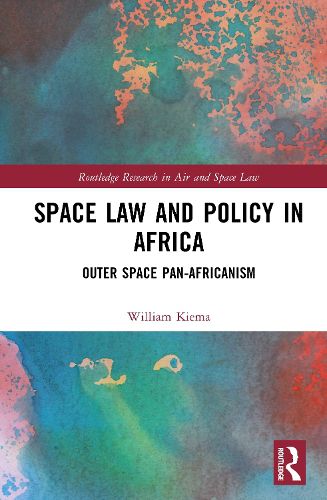Readings Newsletter
Become a Readings Member to make your shopping experience even easier.
Sign in or sign up for free!
You’re not far away from qualifying for FREE standard shipping within Australia
You’ve qualified for FREE standard shipping within Australia
The cart is loading…






This book explores a normative and regulatory pathway for Africa's venture into outer space. It situates African space law and policy within the continent's regionalist vision and mission under Agenda 2063 while also engaging in a comparative analysis with global models to suggest new legal standards, investment approaches, and institutional measures that can be adopted incrementally by the Member States.
The volume emphasises how space is no longer an aspirational luxury but a critical infrastructure for food security, climate resilience, education, medicine, and continental cohesion. It proposes the idea of 'Outer Space Pan-Africanism' as an essential lens for interpreting and shaping the political economy of outer space law and policy in Africa. It defines this 'Outer-Space Pan-Africanism' as a set of six principles based on Pan-African solidarity in outer space initiatives, technological self-reliance, equitable access to space benefits and alignment with global space law and policy. Through case studies of South Africa, Kenya, Nigeria, Algeria, Angola and Egypt, the book discusses how divergent legal and policy models interact with regional development objectives. At the same time, it also examines the significance of benchmarks drawn from the European Union (EU), Latin America and the Caribbean, the Arab World, and the Association of Southeast Asian Nations (ASEAN) in illuminating transferable lessons in funding mechanisms, governance, technology transfer and phased integration.
This book will be useful for postgraduate students, researchers and academics interested in space law, international economic law, development economics and political economy, international relations and regional integration in Africa.
$9.00 standard shipping within Australia
FREE standard shipping within Australia for orders over $100.00
Express & International shipping calculated at checkout
Stock availability can be subject to change without notice. We recommend calling the shop or contacting our online team to check availability of low stock items. Please see our Shopping Online page for more details.
This book explores a normative and regulatory pathway for Africa's venture into outer space. It situates African space law and policy within the continent's regionalist vision and mission under Agenda 2063 while also engaging in a comparative analysis with global models to suggest new legal standards, investment approaches, and institutional measures that can be adopted incrementally by the Member States.
The volume emphasises how space is no longer an aspirational luxury but a critical infrastructure for food security, climate resilience, education, medicine, and continental cohesion. It proposes the idea of 'Outer Space Pan-Africanism' as an essential lens for interpreting and shaping the political economy of outer space law and policy in Africa. It defines this 'Outer-Space Pan-Africanism' as a set of six principles based on Pan-African solidarity in outer space initiatives, technological self-reliance, equitable access to space benefits and alignment with global space law and policy. Through case studies of South Africa, Kenya, Nigeria, Algeria, Angola and Egypt, the book discusses how divergent legal and policy models interact with regional development objectives. At the same time, it also examines the significance of benchmarks drawn from the European Union (EU), Latin America and the Caribbean, the Arab World, and the Association of Southeast Asian Nations (ASEAN) in illuminating transferable lessons in funding mechanisms, governance, technology transfer and phased integration.
This book will be useful for postgraduate students, researchers and academics interested in space law, international economic law, development economics and political economy, international relations and regional integration in Africa.